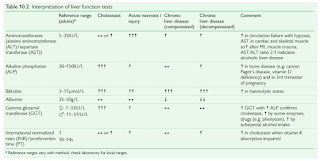Prescribing in Hepatic Impairment
Introduction
Liver disease may alter the response to drugs in several ways, and hence drug prescribing should be kept to a minimum in all patients with severe liver disease.
- The main problems occur in patients with jaundice, ascites, or evidence of encephalopathy.
Impaired Drug Metabolism
Metabolism by the liver is the main route of elimination for many drugs, but hepatic reserve is large and liver disease has to be severe before important changes in drug metabolism occur.
- Routine liver-function tests are a poor guide to the capacity of the liver to metabolise drugs, and in the individual patient it is not possible to predict the extent to which the metabolism of a particular drug may be impaired.
A few drugs, e.g. rifampicin and fusidic acid, are excreted in the bile unchanged and can accumulate in patients with intrahepatic or extrahepatic obstructive jaundice.
Hypoproteinaemia
The liver is the main source of synthesis of plasma proteins (e.g. albumin).
- The hypoalbuminemia in severe liver disease is associated with reduced protein binding and increased toxicity of some highly protein-bound drugs such as phenytoin and prednisolone.
Reduced Clotting
Reduced hepatic synthesis of blood-clotting factors, indicated by a prolonged prothrombin time, increases the sensitivity to oral anticoagulants such as warfarin sodium and phenindione.
Similarly, drugs that increase the risk of bleeding (e.g. NSAIDs, SSRIs) or thrombocytopenia should be used with caution.
Hepatic Encephalopathy
In severe liver disease, many drugs can further impair cerebral function and may precipitate hepatic encephalopathy.
- These include all sedative drugs, opioid analgesics, those diuretics that produce hypokalaemia, and drugs that cause constipation.
Fluid overload
Oedema and ascites in chronic liver disease can be exacerbated by drugs that give rise to fluid retention e.g. NSAIDs and corticosteroids.
Drugs with high sodium content (e.g. soluble/effervescent formulations, some antacids) should also be avoided.
Hepatotoxic Drugs
Hepatotoxicity is either dose-related or unpredictable (idiosyncratic).
- Drugs that cause dose-related toxicity may do so at lower doses in the presence of hepatic impairment than in individuals with normal liver function, and some drugs that produce reactions of the idiosyncratic kind do so more frequently in patients with liver disease.
- These drugs should be avoided or used very carefully in patients with liver disease.
Consider the clinical urgency for treatment, whether a safer alternative is available, length of treatment and incidence, severity, reversibility, and type of drug-induced liver disease with the nature of the patient's pre-existing liver disease.


Comments
Post a Comment